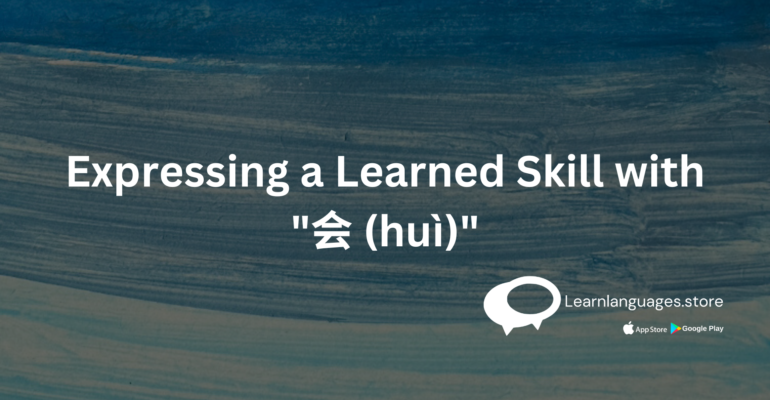Expressing a Learned Skill with “会 (huì)”
Expressing a Learned Skill with “会 (huì)”
Estimated reading time: 3 minutes

The word 会 (huì) in Mandarin Chinese is used to express an ability that has been learned, such as speaking a language or performing a specific task. This blog will provide a detailed explanation of how to use 会 (huì) in Chinese grammar, with examples, pronunciation guides, and humor to make learning fun.
Basic Usage
Structure: Subject + 会 + Verb + Object.
This structure is used to express various skills or abilities, ranging from languages to daily life skills like cooking or driving.
Examples:
- 他 会 说 中文。
Tā huì shuō Zhōngwén.
He can speak Chinese.
वह चीनी बोल सकता है। - 我 会 写 汉字。
Wǒ huì xiě Hànzì.
I can write Chinese characters.
मुझे चीनी अक्षर लिखना आता है। - 你 会 做饭 吗?
Nǐ huì zuòfàn ma?
Can you cook food?
क्या आप खाना पकाना जानते हैं?
Negating 会 (huì) Sentences
Structure: To negate 会 (huì) sentences, use 不 (bù) before 会 (huì):
Subject + 不 + 会 + Verb + Object.
Due to a tone change rule for “不” (bù), the phrase “不会” (bù huì) is pronounced as “bú huì.”
Examples:
- 我 不会 说 英文。
Wǒ bù huì shuō Yīngwén.
I can’t speak English.
मैं अंग्रेज़ी नहीं बोल सकता। - 妈妈 不会 做 中国 菜。
Māma bù huì zuò Zhōngguó cài.
Mom can’t cook Chinese food.
माँ चीनी खाना नहीं बना सकती। - 你 不会 游泳 吗?
Nǐ bù huì yóuyǒng ma?
You can’t swim?
तुम तैरना नहीं जानते?
Grammar Explanation in English and Hindi
Using 会 (huì):
- Hindi: क्रिया 会 (huì) का उपयोग सीखी हुई क्षमताओं या कौशल को व्यक्त करने के लिए किया जाता है। यह संरचना का पालन करता है: विषय + 会 + क्रिया + वस्तु।
- English: The verb 会 (huì) is used to express learned skills or abilities. It follows the structure: Subject + 会 + Verb + Object.
Exception
While 会 (huì) is used to express learned skills, it cannot be used to express the possibility of something happening, which is expressed using 能 (néng).
Learn Languages Store
Vashi,
Email: services@learnlanguages.store










